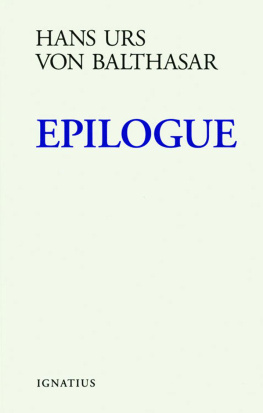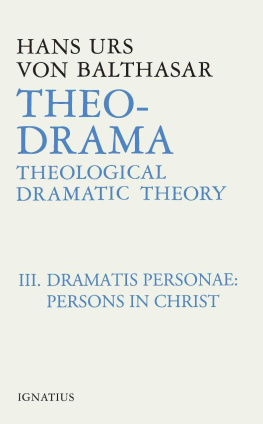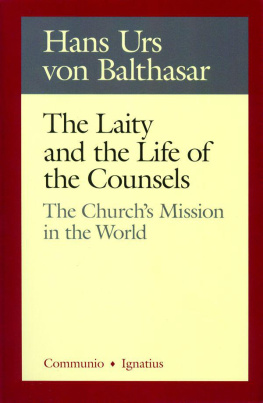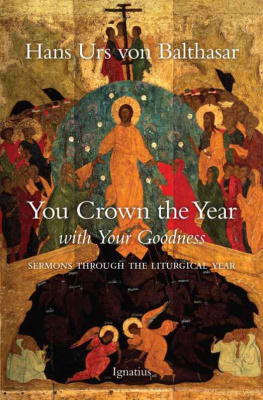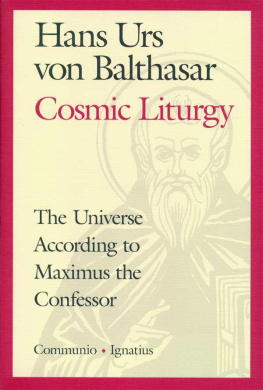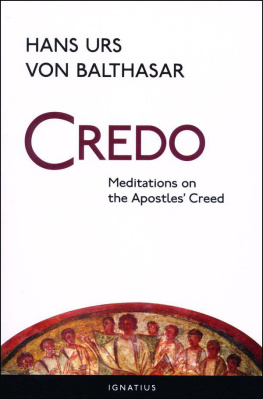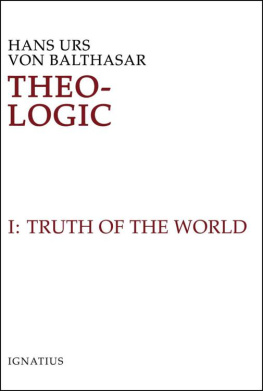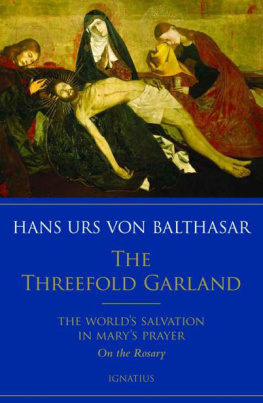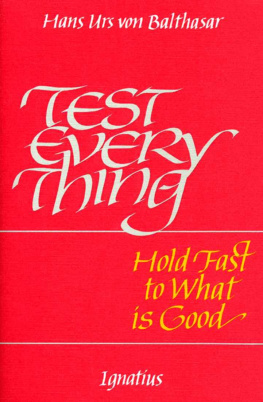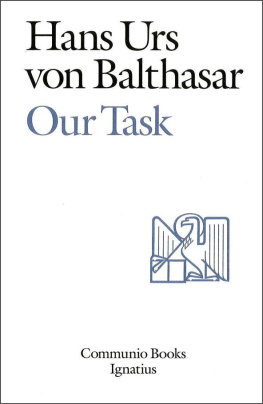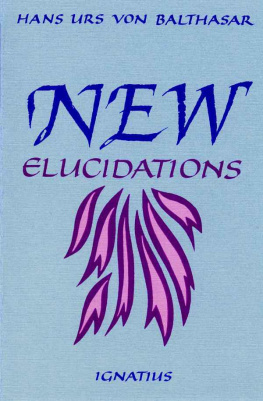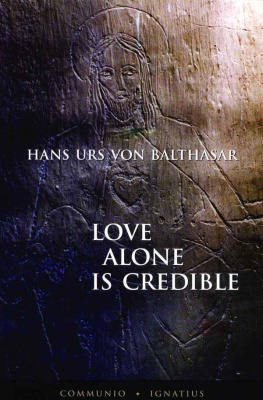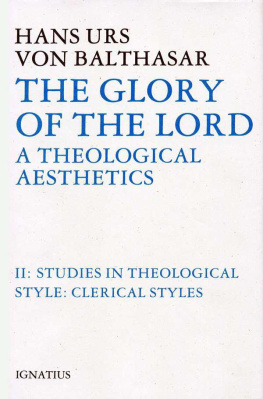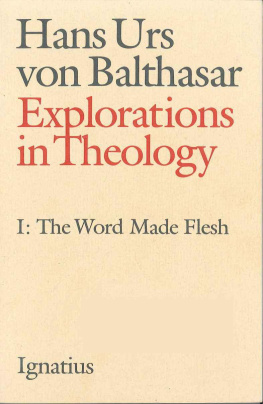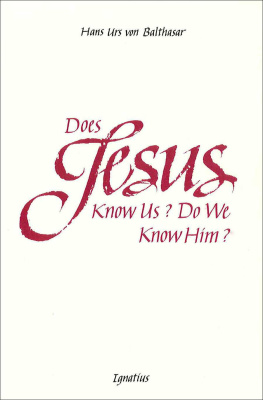Hans Urs von Balthasar - Epilogue
Here you can read online Hans Urs von Balthasar - Epilogue full text of the book (entire story) in english for free. Download pdf and epub, get meaning, cover and reviews about this ebook. year: 1991, publisher: Ignatius Press, genre: Religion. Description of the work, (preface) as well as reviews are available. Best literature library LitArk.com created for fans of good reading and offers a wide selection of genres:
Romance novel
Science fiction
Adventure
Detective
Science
History
Home and family
Prose
Art
Politics
Computer
Non-fiction
Religion
Business
Children
Humor
Choose a favorite category and find really read worthwhile books. Enjoy immersion in the world of imagination, feel the emotions of the characters or learn something new for yourself, make an fascinating discovery.
- Book:Epilogue
- Author:
- Publisher:Ignatius Press
- Genre:
- Year:1991
- Rating:4 / 5
- Favourites:Add to favourites
- Your mark:
- 80
- 1
- 2
- 3
- 4
- 5
Epilogue: summary, description and annotation
We offer to read an annotation, description, summary or preface (depends on what the author of the book "Epilogue" wrote himself). If you haven't found the necessary information about the book — write in the comments, we will try to find it.
Epilogue — read online for free the complete book (whole text) full work
Below is the text of the book, divided by pages. System saving the place of the last page read, allows you to conveniently read the book "Epilogue" online for free, without having to search again every time where you left off. Put a bookmark, and you can go to the page where you finished reading at any time.
Font size:
Interval:
Bookmark:
EPILOGUE
THE GLORY OF THE LORD:
A THEOLOGICAL AESTHETICS
I: Seeing the Form
II: Studies in Theological Style: Clerical Styles
III: Studies in Theological Style: Lay Styles
IV: The Realm of Metaphysics in Antiquity
V: The Realm of Metaphysics in the Modern Age
VI: Theology: The Old Covenant
VII: Theology: The New Covenant
THEO-DRAMA
I: Prolegomena
II: The Dramatis Personae: Man in God
III: The Dramatis Personae: The Person in Christ
IV: The Performance
V: The Last Act
THEO-LOGIC
I: Truth of the World
II: Truth of God
III: The Spirit of Truth
EPILOGUE
HANS URS VON BALTHASAR
Translated by Edward T. Oakes, S.J.
IGNATIUS PRESS SAN FRANCISCO
Title of the German original: Epilog
1987 by Johannes Verlag Einsiedein, Trier
Cover design by Roxanne Mei Lum
2004 Ignatius Press, San Francisco
All rights reserved
ISBN 978-089870-281-1
Library of Congress Control Number 2004114782
Printed in the United States of America
GL The Glory of the Lord: A Theological Aesthetics
TD Theo-Drama
TL Theo-Logic
This Epilogue to my trilogy has been written to afford the weary reader something like an overview of the whole enterprise. It was after all a large project (now swollen to sixteen volumes). The reason it grew to such an ungainly size is because it sought to treat such sweeping topics as aesthetics, theo-drama, and theo-logic in a manner sufficient to such large themes. But this overview does not mean to offer the reader a kind of Readers Digest of the whole, that is, a condensed, summary version of the trilogy. Rather, it wants to explain why the trilogy has tried to present theology from the perspective of the Platonic transcendentals instead of, as used to be done, in the traditional tractate style ( loci theology, as it was called). Meaning simply this: How might we make the smoothest transition from a true (and thereby religious) philosophy to biblical revelation? Hence the title of part 2 of the Epilogue , Threshold, where we will try to effect this transition.
But before reaching this threshold we must first pursue an indispensable, albeit insufficient, kind of apologetic: the Bible and Christianity compete for adherents within an abundant marketplace of religious wares. At first glance, these goods seem to jostle with each other on the same level of exchange, differing only in price and mortgage rates, so to speak, but all requiring the same legal tender. More deeply considered, however, they all obviously operate with different currencies and rates of exchange, forming, as it were, a hierarchy of meanings and interpretations. So one can try to show that the less comprehensive interpretations can be accommodated within the more comprehensive. But if we can manage to show that, the result will then obviously prompt the question of where one might find the highest integration. The seeker after truth cannot dispense with this method; but if it is to be finally fruitful for him, he cannot dispense with what has been developed in the Aesthetics . Hence the title of part 1: Forecourt.
But what lies past the threshold? These are the so-called mysteries of Christianity, which cannot be derived from any religious philosophy. Given the confines of this Epilogue , these mysteries can obviously only be delineated here in meager outlines, leaving out so much that is necessary for understanding them. For that, one can always mine the immense riches of theology from the past two thousand years of the Churchs theology on ones own.
So a great deal that we have treated extensively elsewhere will not be mentioned here. There is, for example, nothing here in this concluding volume on prayer, nothing on Christian life as theoria and praxis , nothing on person and mission, on the states of life within the Church; but also no tract on Trinity, Christology, Mariology, or on the great figures of the Church: saints, theologians, and so forth. Why say again what has already been said? So let us just let this Epilogue be what the old French ballads call an envoi .
Now whether this concluding word has much to say for catechesis and for the teaching mission of the Church in the face of the kind of society and civilization as we encounter them today I sincerely doubt. The slogan is much bruited about these days that we should try to meet modern man where he is. According to one report, in America an adolescent by the time he has reached the age of seventeen has on average sat in front of a television set for 15,000 hours, the equivalent of almost two full years. Here in Europe, according to a recent study, children even as early as three- to six-year-olds sit before the TV screen on an average of five to six hours a week, and ten- to thirteen-year-olds devote more than twelve hours a week to it. Hans Meier quite justifiably wonders aloud whether, in this age of the media, we are handing on a cultural legacy (and a religious faith) and, if we are not, whether we will not finally lose, with the lost language, our very ability to hear and see anything at all.
So severe is this situation that most teachers of religion ask, with equal justice, just who these ruins are whom we should try to meet (against their will!) where they are. A missionary toiling in the savannas of Africa or on the atolls of the Pacific has it relatively easy: he encounters a perhaps primitive anima naturaliter christiana . What might come across to the native as pure theological Chinese he can easily translate into the simplest of languages. But where is the famous point of contact with the anima technica vacua ? I for one certainly do not know. Some table-rapping, a sance or two, some dabbling in Zen meditation, a smattering of liberation theology: enough.
This little work can hardly be more than a bottle thrown into the sea. To find land and to have someone actually come across it, now that would be a miracle. But sometimes even miracles happen.
INTEGRATION AS METHOD?
In the midst of the abundant number of choices for adopting a world view currently available today, the possibility of being a Christian is but one option among many. Now the Christian religion cannot thrust itself into first place, for this would contradict the spirit of its Founder and of its best representatives. It must seek to establish its credibility and, according to its own understanding, its uniqueness with purely spiritual / intellectual arguments that, paradoxically enough, must not come across as so compelling as to vitiate the act of free faith and free self-surrender. It must first get into line with the contenders, each one of which makes its claim to comprehensive truth, or at least to being right. And then, from its place, Christianity must test the validity of all these claims in line and acknowledge their portion of the truth as a relative one. In this way, from the Christian standpoint, something like a stepladder of admissible truths will arise that can be arranged according to the well-known German proverb, Wer mehr Wahrheit sieht, hat mehr recht (Whoever sees more of the truth is more profoundly right).
This approach corresponds to the early Christian doctrine of the logoi spermatikoi that are scattered throughout the entire cultural and intellectual world of humanity. However, this doctrine should not be taken in such a way as to imply that mutually exclusive doctrines and points of view could have an equal share in this scattered Logos (for then the Logos would thus have to be continually contradicting itself). Rather, it means that the less extensive views are integrated into more comprehensive ones. Thus, whoever could integrate the most truth in this vision would have claim to the highest attainable truth. He would beif one might cite here a statement of Paul taken out of its proper contextthat spiritual man who can judge everything but who himself is judged by no one (1 Cor 2:15), because no one but he possesses so comprehensive a view of the truth.
Next pageFont size:
Interval:
Bookmark:
Similar books «Epilogue»
Look at similar books to Epilogue. We have selected literature similar in name and meaning in the hope of providing readers with more options to find new, interesting, not yet read works.
Discussion, reviews of the book Epilogue and just readers' own opinions. Leave your comments, write what you think about the work, its meaning or the main characters. Specify what exactly you liked and what you didn't like, and why you think so.

